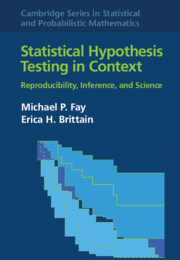Book contents
- Frontmatter
- Contents
- Preface
- 1 Introduction
- 2 Theory of Tests, p-Values, and Confidence Intervals
- 3 From Scientific Theory to Statistical Hypothesis Test
- 4 One-Sample Studies with Binary Responses
- 5 One-Sample Studies with Ordinal or Numeric Responses
- 6 Paired Data
- 7 Two-Sample Studies with Binary Responses
- 8 Assumptions and Hypothesis Tests
- 9 Two-Sample Studies with Ordinal or Numeric Responses
- 10 General Methods for Frequentist Inferences
- 11 k-Sample Studies and Trend Tests
- 12 Clustering and Stratification
- 13 Multiplicity in Testing
- 14 Testing from Models
- 15 Causality
- 16 Censoring
- 17 Missing Data
- 18 Group Sequential and Related Adaptive Methods
- 19 Testing Fit, Equivalence, and Noninferiority
- 20 Power and Sample Size
- 21 Bayesian Hypothesis Testing
- References
- Notation Index
- Concept Index
15 - Causality
Published online by Cambridge University Press: 17 April 2022
- Frontmatter
- Contents
- Preface
- 1 Introduction
- 2 Theory of Tests, p-Values, and Confidence Intervals
- 3 From Scientific Theory to Statistical Hypothesis Test
- 4 One-Sample Studies with Binary Responses
- 5 One-Sample Studies with Ordinal or Numeric Responses
- 6 Paired Data
- 7 Two-Sample Studies with Binary Responses
- 8 Assumptions and Hypothesis Tests
- 9 Two-Sample Studies with Ordinal or Numeric Responses
- 10 General Methods for Frequentist Inferences
- 11 k-Sample Studies and Trend Tests
- 12 Clustering and Stratification
- 13 Multiplicity in Testing
- 14 Testing from Models
- 15 Causality
- 16 Censoring
- 17 Missing Data
- 18 Group Sequential and Related Adaptive Methods
- 19 Testing Fit, Equivalence, and Noninferiority
- 20 Power and Sample Size
- 21 Bayesian Hypothesis Testing
- References
- Notation Index
- Concept Index
Summary
This chapter provides a brief review of several important ideas in causality. We define potential outcomes, a pair of outcomes for each individual denoting their response if they had gotten treatment and their response if they had gotten control. Typically, we only observe one of the potential outcomes. We define some causal estimands, such as the average causal difference, vaccine efficacy, and the Mann–Whitney parameter. We discuss estimation of the average causal difference from a matched experiment and a randomized study. Using a hypothetical vaccine study, we discuss why causal inference requires more care and assumptions for observational studies than for experiments. We work through a study to estimate the average causal effect on compliers from a randomized study with imperfect compliance. We define principled adjustments for randomized studies. We discuss interference in causality. We review causal analysis with propensity scores for observational studies. We define directed acyclic graphs (DAGs) and show how they can be used to define the backdoor criterion and confounders. Finally, we discuss instrumental variables analysis.
- Type
- Chapter
- Information
- Statistical Hypothesis Testing in ContextReproducibility, Inference, and Science, pp. 277 - 301Publisher: Cambridge University PressPrint publication year: 2022



